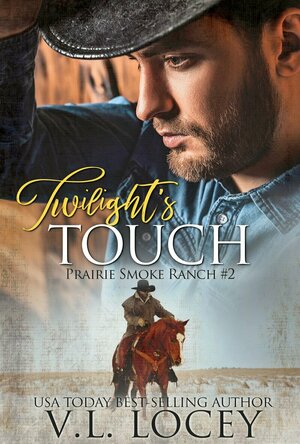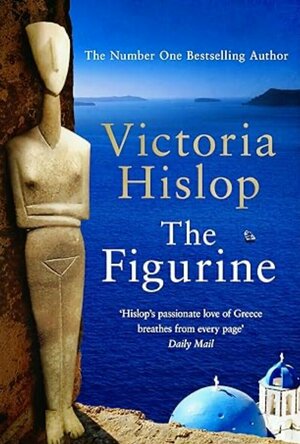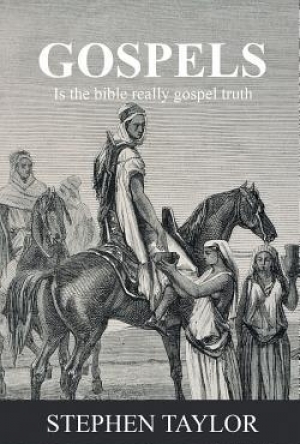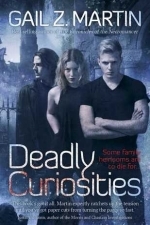Search

La Digue Island Tourism Guide
Navigation and Travel
App
* Universal compact app for iPhone 6 / iPhone 6 Plus / iPhone 5 / iPhone / iPod / iPad LA DIGUE...
Debbiereadsbook (1650 KP) rated Twilight's Touch (Prairie Smoke Ranch #2) in Books
Feb 24, 2022
Only Perry speaks and I wanted Will!
Independent reviewer for Archaeolibrarian, I was gifted my copy of this book.
This is book 2 in the Prairie Smoke Ranch series. I have not read book 1, Dawn's Desire. I didn't feel like I was missing anything, but for the discovery of the bones! I want to go back and read it, though. I'm intrigued, but it's not a necessity to have read, I don't think.
Perry works at Prairie Smoke Ranch, mostly with the horses who don't trust people. He reads to them. Ancient Greek history of all things. I loved this, even if I had no clue who he was reading about!
Will and Perry have a bit of a moment, a while back and its been playing on his mind but Perry, the wonderful human that he is, doesn;t want anyone to know. It could harm his mum and his grandfather and Perry won't do that.
Somewhere along the way, Will gets so far into Perry mind, he crosses into his heart and it really was delightful watching these two dance in the rain!
I loved that Will, bad boy that he is, doesn't want to corrupt Perry, he wants Perry to see it's ok to let go, to be yourself, to TRULY be you.
Or at least that is what I think he wants to do. Because Will doesn't get a say and thats the only reason I can't stretch to the full 5 stars. Perry speaks, and only Perry. And I really wanted Will. Especially after I found they had that moment before. When they were dancing in the rain, and really wanted to hear from Will when Perry finally, FINALLY lets him in.
All in all, a beautifully written book, a wonderful tale, and I want to go back and forward with this series!
4 wonderful stars
*same worded review will appear elsewhere
This is book 2 in the Prairie Smoke Ranch series. I have not read book 1, Dawn's Desire. I didn't feel like I was missing anything, but for the discovery of the bones! I want to go back and read it, though. I'm intrigued, but it's not a necessity to have read, I don't think.
Perry works at Prairie Smoke Ranch, mostly with the horses who don't trust people. He reads to them. Ancient Greek history of all things. I loved this, even if I had no clue who he was reading about!
Will and Perry have a bit of a moment, a while back and its been playing on his mind but Perry, the wonderful human that he is, doesn;t want anyone to know. It could harm his mum and his grandfather and Perry won't do that.
Somewhere along the way, Will gets so far into Perry mind, he crosses into his heart and it really was delightful watching these two dance in the rain!
I loved that Will, bad boy that he is, doesn't want to corrupt Perry, he wants Perry to see it's ok to let go, to be yourself, to TRULY be you.
Or at least that is what I think he wants to do. Because Will doesn't get a say and thats the only reason I can't stretch to the full 5 stars. Perry speaks, and only Perry. And I really wanted Will. Especially after I found they had that moment before. When they were dancing in the rain, and really wanted to hear from Will when Perry finally, FINALLY lets him in.
All in all, a beautifully written book, a wonderful tale, and I want to go back and forward with this series!
4 wonderful stars
*same worded review will appear elsewhere
ClareR (6062 KP) rated The Figurine in Books
Nov 20, 2023
I do love Victoria Hislop books, and in The Figurine I was transported back to Greece in the 1960’s with dictators ruling and a young girl, Helena, visiting her affluent grandparents on her own. Her grandfather is authoritarian, aloof, and never really connects with his granddaughter, but her grandmother clearly adores her. Through these summer visits, Helena grows to love Greece, even if she never manages to form a relationship with her grandfather.
As she gets older, Helena goes to university, meets a man who convinces her to go on archaeological digs on Greek Islands, and she then discovers antiques in her grandparents flat after their deaths - antiques that should not be owned by a private collector at all. These antiques are not acquired under legitimate means, and just how they were acquired soon becomes very clear to Helena. With the help of some Greek friends she is able to start the process of returning the valuable antiques to their rightful owners - the Greek people.
There is still the matter of a dodgy, antique smuggling boyfriend to deal with, and to do so involves the help of friends in London. So this story goes between London and Greece - and believe me when I say that Greece is painted in a much more favourable light than London. Everything seems grey and cold in London, and Greece is all sunshine and warmth. I know where I would rather be.
I love how Hislop writes about Greece: she’s clearly a Hellenophile, and why wouldn’t she be?! It’s a beautiful country. And when the matter of an ancient figurine comes up (that of the title of the book), we see how important even the smallest piece of Greece’s history is to the country as a whole.
Another gorgeous book from Victoria Hislop - a good one to read during the dull winter months that we have coming our way!
Read on The Pigeonhole.
As she gets older, Helena goes to university, meets a man who convinces her to go on archaeological digs on Greek Islands, and she then discovers antiques in her grandparents flat after their deaths - antiques that should not be owned by a private collector at all. These antiques are not acquired under legitimate means, and just how they were acquired soon becomes very clear to Helena. With the help of some Greek friends she is able to start the process of returning the valuable antiques to their rightful owners - the Greek people.
There is still the matter of a dodgy, antique smuggling boyfriend to deal with, and to do so involves the help of friends in London. So this story goes between London and Greece - and believe me when I say that Greece is painted in a much more favourable light than London. Everything seems grey and cold in London, and Greece is all sunshine and warmth. I know where I would rather be.
I love how Hislop writes about Greece: she’s clearly a Hellenophile, and why wouldn’t she be?! It’s a beautiful country. And when the matter of an ancient figurine comes up (that of the title of the book), we see how important even the smallest piece of Greece’s history is to the country as a whole.
Another gorgeous book from Victoria Hislop - a good one to read during the dull winter months that we have coming our way!
Read on The Pigeonhole.
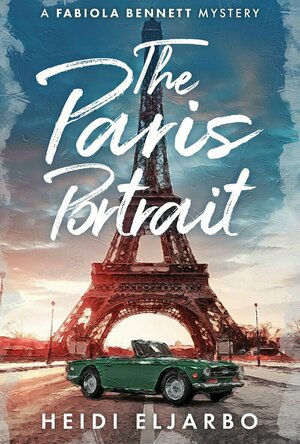
The Paris Portrait (A Fabiola Bennett Mystery #3)
Book
Fabiola stumbles upon a clue that indicates a royal portrait went missing almost two hundred years...
Historical Mystery Art History Dual Timeline
Adventure and Redemption
I received this book for free through Goodreads First Reads.
Is the Bible really gospel truth? This is the question the honourable, academic Robert Babcock aims to find out on his quest to find the earliest copies of the gospels in order to prove the reliability of the story of Jesus as recounted in the King James Bible. However, this is not the key focus of Stephen Taylor’s fictional novel, Gospels. The main character is the perfidious John Campbell-John, a rogue, imposter and swindler who flees 19th-century England in an attempt to escape from his debts.
John meets the magnanimous Robert in Venice and, despite being polar opposites, become firm friends. After being honest for the first time in his life, admitting to owing thousands of pounds in gambling debts, Robert offers John the opportunity to accompany him on his quest through the deserts of Egypt. John accepts and the pair finds themselves on an adventure of discovery and personal redemption.
John and Robert make an unlikely but excellent team. Robert’s knowledge of the Bible and ancient history is vital, however, John’s propensity for falsehoods and cunningness gets them out of a few scrapes and tricky situations. Nonetheless, it is difficult for John to give up his old ways and his insular behaviour threatens to get them in more trouble.
Fortunately, Robert’s humility begins to influence the young scoundrel, as does his penchant for historical artefacts. As the story progresses, John begins to leave his past behind and becomes interested in Robert’s work, learning new things about Egyptian culture and the origins of the Bible. However, when a new gospel comes to light that threatens the whole of Christianity, Robert does not know what to do; and only John can give him counsel.
John Campbell-John is a character that the author introduced in a previous book. However, the timelines are not sequential, therefore Gospels is a stand-alone novel. The time frame for this book needed to be set in 1835 to correspond with historical truths. Although Robert’s discovery of a Gospel of Thaddeus Jude is an invention of the author, the quest itself is based on the journeys of three 19th-century Bible hunters. Stephen Taylor has conducted an enormous amount of research, including the biographies of Robert Curzon, Constantin von Tischendorf and Émile Amélineau who, on separate occasions, sought the same knowledge as the fictional Robert Babcock.
Despite being titled Gospels, the novel, for the most part, focuses on John Campbell-John and his wicked ways. Through a first-person narrative, John explains his past, his betrayal of a friend, and his addiction to gambling. Initially, he has no qualms about his behaviour and acts only for himself and his selfish greed. Whilst Robert goes in search of knowledge, John goes on a journey of redemption, coming to terms with his previous wrongdoings. However, acknowledging these faults is not enough, he needs to turn away from these roguish ways.
It is disappointing that the narrative does not focus more on the gospels, both real and imagined. There was enormous scope for an in-depth look at the life of Jesus and the inconsistencies in the Bible. The fictitious Gospel of Thaddeus Jude evokes a similar reaction in Robert as the Non-Canonical Gospel of Thomas found in the 19th-century had on many devout Christians. There was so much potential with this direction of thought, however, the author passes over it in preference to the life of John Campbell-John.
Slow to begin but increasingly interesting as it progresses, Gospels is a book of many themes. History, both 19th-century and ancient; religion, although not a Christian story; and achievement and absolution combine together to produce a unique tale that takes the reader from the back alleys of London to the River Nile and the deserts of Sinai. A subtle clue in the prologue keeps readers alert as they await the conclusion of the adventure – an ending that ambiguously reveals whether John moves on from the follies of his past.
Is the Bible really gospel truth? This is the question the honourable, academic Robert Babcock aims to find out on his quest to find the earliest copies of the gospels in order to prove the reliability of the story of Jesus as recounted in the King James Bible. However, this is not the key focus of Stephen Taylor’s fictional novel, Gospels. The main character is the perfidious John Campbell-John, a rogue, imposter and swindler who flees 19th-century England in an attempt to escape from his debts.
John meets the magnanimous Robert in Venice and, despite being polar opposites, become firm friends. After being honest for the first time in his life, admitting to owing thousands of pounds in gambling debts, Robert offers John the opportunity to accompany him on his quest through the deserts of Egypt. John accepts and the pair finds themselves on an adventure of discovery and personal redemption.
John and Robert make an unlikely but excellent team. Robert’s knowledge of the Bible and ancient history is vital, however, John’s propensity for falsehoods and cunningness gets them out of a few scrapes and tricky situations. Nonetheless, it is difficult for John to give up his old ways and his insular behaviour threatens to get them in more trouble.
Fortunately, Robert’s humility begins to influence the young scoundrel, as does his penchant for historical artefacts. As the story progresses, John begins to leave his past behind and becomes interested in Robert’s work, learning new things about Egyptian culture and the origins of the Bible. However, when a new gospel comes to light that threatens the whole of Christianity, Robert does not know what to do; and only John can give him counsel.
John Campbell-John is a character that the author introduced in a previous book. However, the timelines are not sequential, therefore Gospels is a stand-alone novel. The time frame for this book needed to be set in 1835 to correspond with historical truths. Although Robert’s discovery of a Gospel of Thaddeus Jude is an invention of the author, the quest itself is based on the journeys of three 19th-century Bible hunters. Stephen Taylor has conducted an enormous amount of research, including the biographies of Robert Curzon, Constantin von Tischendorf and Émile Amélineau who, on separate occasions, sought the same knowledge as the fictional Robert Babcock.
Despite being titled Gospels, the novel, for the most part, focuses on John Campbell-John and his wicked ways. Through a first-person narrative, John explains his past, his betrayal of a friend, and his addiction to gambling. Initially, he has no qualms about his behaviour and acts only for himself and his selfish greed. Whilst Robert goes in search of knowledge, John goes on a journey of redemption, coming to terms with his previous wrongdoings. However, acknowledging these faults is not enough, he needs to turn away from these roguish ways.
It is disappointing that the narrative does not focus more on the gospels, both real and imagined. There was enormous scope for an in-depth look at the life of Jesus and the inconsistencies in the Bible. The fictitious Gospel of Thaddeus Jude evokes a similar reaction in Robert as the Non-Canonical Gospel of Thomas found in the 19th-century had on many devout Christians. There was so much potential with this direction of thought, however, the author passes over it in preference to the life of John Campbell-John.
Slow to begin but increasingly interesting as it progresses, Gospels is a book of many themes. History, both 19th-century and ancient; religion, although not a Christian story; and achievement and absolution combine together to produce a unique tale that takes the reader from the back alleys of London to the River Nile and the deserts of Sinai. A subtle clue in the prologue keeps readers alert as they await the conclusion of the adventure – an ending that ambiguously reveals whether John moves on from the follies of his past.
<i>I received this book for free through Goodreads First Reads.
Is the Bible really gospel truth?</i> This is the question the honourable, academic Robert Babcock aims to find out on his quest to find the earliest copies of the gospels in order to prove the reliability of the story of Jesus as recounted in the King James Bible. However, this is not the key focus of Stephen Taylor’s fictional novel, <i>Gospels</i>. The main character is the perfidious John Campbell-John, a rogue, imposter and swindler who flees 19th-century England in an attempt to escape from his debts.
John meets the magnanimous Robert in Venice and, despite being polar opposites, become firm friends. After being honest for the first time in his life, admitting to owing thousands of pounds in gambling debts, Robert offers John the opportunity to accompany him on his quest through the deserts of Egypt. John accepts and the pair finds themselves on an adventure of discovery and personal redemption.
John and Robert make an unlikely but excellent team. Robert’s knowledge of the Bible and ancient history is vital, however, John’s propensity for falsehoods and cunningness gets them out of a few scrapes and tricky situations. Nonetheless, it is difficult for John to give up his old ways and his insular behaviour threatens to get them in more trouble.
Fortunately, Robert’s humility begins to influence the young scoundrel, as does his penchant for historical artefacts. As the story progresses, John begins to leave his past behind and becomes interested in Robert’s work, learning new things about Egyptian culture and the origins of the Bible. However, when a new gospel comes to light that threatens the whole of Christianity, Robert does not know what to do; and only John can give him counsel.
John Campbell-John is a character that the author introduced in a previous book. However, the timelines are not sequential, therefore <i>Gospels</i> is a stand-alone novel. The time frame for this book needed to be set in 1835 to correspond with historical truths. Although Robert’s discovery of a Gospel of Thaddeus Jude is an invention of the author, the quest itself is based on the journeys of three 19th-century Bible hunters. Stephen Taylor has conducted an enormous amount of research, including the biographies of Robert Curzon, Constantin von Tischendorf and Émile Amélineau who, on separate occasions, sought the same knowledge as the fictional Robert Babcock.
Despite being titled <i>Gospels</i>, the novel, for the most part, focuses on John Campbell-John and his wicked ways. Through a first-person narrative, John explains his past, his betrayal of a friend, and his addiction to gambling. Initially, he has no qualms about his behaviour and acts only for himself and his selfish greed. Whilst Robert goes in search of knowledge, John goes on a journey of redemption, coming to terms with his previous wrongdoings. However, acknowledging these faults is not enough, he needs to turn away from these roguish ways.
It is disappointing that the narrative does not focus more on the gospels, both real and imagined. There was enormous scope for an in-depth look at the life of Jesus and the inconsistencies in the Bible. The fictitious Gospel of Thaddeus Jude evokes a similar reaction in Robert as the Non-Canonical Gospel of Thomas found in the 19th-century had on many devout Christians. There was so much potential with this direction of thought, however, the author passes over it in preference to the life of John Campbell-John.
Slow to begin but increasingly interesting as it progresses, <i>Gospels</i> is a book of many themes. History, both 19th-century and ancient; religion, although not a Christian story; and achievement and absolution combine together to produce a unique tale that takes the reader from the back alleys of London to the River Nile and the deserts of Sinai. A subtle clue in the prologue keeps readers alert as they await the conclusion of the adventure – an ending that ambiguously reveals whether John moves on from the follies of his past.
Is the Bible really gospel truth?</i> This is the question the honourable, academic Robert Babcock aims to find out on his quest to find the earliest copies of the gospels in order to prove the reliability of the story of Jesus as recounted in the King James Bible. However, this is not the key focus of Stephen Taylor’s fictional novel, <i>Gospels</i>. The main character is the perfidious John Campbell-John, a rogue, imposter and swindler who flees 19th-century England in an attempt to escape from his debts.
John meets the magnanimous Robert in Venice and, despite being polar opposites, become firm friends. After being honest for the first time in his life, admitting to owing thousands of pounds in gambling debts, Robert offers John the opportunity to accompany him on his quest through the deserts of Egypt. John accepts and the pair finds themselves on an adventure of discovery and personal redemption.
John and Robert make an unlikely but excellent team. Robert’s knowledge of the Bible and ancient history is vital, however, John’s propensity for falsehoods and cunningness gets them out of a few scrapes and tricky situations. Nonetheless, it is difficult for John to give up his old ways and his insular behaviour threatens to get them in more trouble.
Fortunately, Robert’s humility begins to influence the young scoundrel, as does his penchant for historical artefacts. As the story progresses, John begins to leave his past behind and becomes interested in Robert’s work, learning new things about Egyptian culture and the origins of the Bible. However, when a new gospel comes to light that threatens the whole of Christianity, Robert does not know what to do; and only John can give him counsel.
John Campbell-John is a character that the author introduced in a previous book. However, the timelines are not sequential, therefore <i>Gospels</i> is a stand-alone novel. The time frame for this book needed to be set in 1835 to correspond with historical truths. Although Robert’s discovery of a Gospel of Thaddeus Jude is an invention of the author, the quest itself is based on the journeys of three 19th-century Bible hunters. Stephen Taylor has conducted an enormous amount of research, including the biographies of Robert Curzon, Constantin von Tischendorf and Émile Amélineau who, on separate occasions, sought the same knowledge as the fictional Robert Babcock.
Despite being titled <i>Gospels</i>, the novel, for the most part, focuses on John Campbell-John and his wicked ways. Through a first-person narrative, John explains his past, his betrayal of a friend, and his addiction to gambling. Initially, he has no qualms about his behaviour and acts only for himself and his selfish greed. Whilst Robert goes in search of knowledge, John goes on a journey of redemption, coming to terms with his previous wrongdoings. However, acknowledging these faults is not enough, he needs to turn away from these roguish ways.
It is disappointing that the narrative does not focus more on the gospels, both real and imagined. There was enormous scope for an in-depth look at the life of Jesus and the inconsistencies in the Bible. The fictitious Gospel of Thaddeus Jude evokes a similar reaction in Robert as the Non-Canonical Gospel of Thomas found in the 19th-century had on many devout Christians. There was so much potential with this direction of thought, however, the author passes over it in preference to the life of John Campbell-John.
Slow to begin but increasingly interesting as it progresses, <i>Gospels</i> is a book of many themes. History, both 19th-century and ancient; religion, although not a Christian story; and achievement and absolution combine together to produce a unique tale that takes the reader from the back alleys of London to the River Nile and the deserts of Sinai. A subtle clue in the prologue keeps readers alert as they await the conclusion of the adventure – an ending that ambiguously reveals whether John moves on from the follies of his past.
Annie Chanse (15 KP) rated Deadly Curiosities in Books
Dec 19, 2017
I received an ARC copy of this book in exchange for my open and honest opinion. This in no way has influenced my opinion of the book.
***may contain spoilers***
This book by Martin is the first in a new series that centers around Cassidy, the owner of an antique shop called Trifles and Folly. At least, that is what she does on the surface. Her true purpose is much less mundane. She, along with her "silent partner" Sorren -- an ancient vampire -- and her employee and friend Teag, work for a group called the Alliance.
The Alliance has been around for centuries, and they do many things. However, one of the most important things they do is to rid the world of powerful and dangerous paranormal artifacts. Cassidy, a powerful psychometric -- someone who "reads" an item's energy and history -- uses her antique shop to help the Alliance with their endeavor. When people bring items into her shop, she holds them and sees the history that happened around those objects. If something in the object's history gives off warning signals that Cassidy thinks might make the item dangerous and/or susceptible to hauntings, possessions, etc., she buys the item and presents it to Sorren to take to the Alliance, where they dispose of it safely. (At least that is what they are SUPPOSEDLY DOING... since this is the beginning of a series, I'm wondering if eventually Cassidy will find out that the Alliance's motives aren't as pure as they claim them to be... but that is simply my speculation and neither here nor there concerning this book. :-p)
The fun in THIS book really begins when a lady brings in a pair of antique opera glasses to sell to Cassidy. Shortly after, Cassidy receives a phone call from a buyer saying that items she purchased from Cassidy's shop are causing a lot of ghostly-type problems. Cassidy and Teag realize that several items which should not have been causing negative effects are, in fact, creating all kinds of havoc. They decide to investigate the phenomena, and this investigation leads to all kinds of craziness, including voudon practitioners, dark sorcerers who should have been dead centuries before, a nasty demon, and a man who surrounds himself with hundreds of clocks everywhere he goes... And this is just a taste of what a reader finds in the pages of Martin's new book.
The storyline is interesting and unique. The characters are very likeable. The setting is lovely and perfect. The writing style is solid. And the action is well-paced, after the first thirty or so pages, which are a bit slow.
The only complaint I have with this novel is that at times it is a bit repetitive. For instance, one line might mention something about the blood-caked clothes she's wearing, and the next line will say the same thing, only with differently arranged words.
I wish I had marked an actual specific example of what I was talking about, but I didn't, so I can't provide an example, but I will give my own made up example to illustrate my point.
*Note: This is NOT a line from the actual book. Just something I made up to, again, illustrate the point.*
"She stepped into the room and shivered as the feeling of something watching her from the darkness crept over her. It seemed as though there was something she couldn't see in the darkness, but it could see her, and it was watching her. The thought made her shiver as it crept down her spine."
This didn't happen VERY often in the book, but it did happen enough times that I mentally made a note of it, and it irritated me. I'm a smart girl. You only have to tell me once, and I usually get the picture. Ha.
But overall, I really did enjoy the book, and I look forward to reading the next one when it comes out.
***may contain spoilers***
This book by Martin is the first in a new series that centers around Cassidy, the owner of an antique shop called Trifles and Folly. At least, that is what she does on the surface. Her true purpose is much less mundane. She, along with her "silent partner" Sorren -- an ancient vampire -- and her employee and friend Teag, work for a group called the Alliance.
The Alliance has been around for centuries, and they do many things. However, one of the most important things they do is to rid the world of powerful and dangerous paranormal artifacts. Cassidy, a powerful psychometric -- someone who "reads" an item's energy and history -- uses her antique shop to help the Alliance with their endeavor. When people bring items into her shop, she holds them and sees the history that happened around those objects. If something in the object's history gives off warning signals that Cassidy thinks might make the item dangerous and/or susceptible to hauntings, possessions, etc., she buys the item and presents it to Sorren to take to the Alliance, where they dispose of it safely. (At least that is what they are SUPPOSEDLY DOING... since this is the beginning of a series, I'm wondering if eventually Cassidy will find out that the Alliance's motives aren't as pure as they claim them to be... but that is simply my speculation and neither here nor there concerning this book. :-p)
The fun in THIS book really begins when a lady brings in a pair of antique opera glasses to sell to Cassidy. Shortly after, Cassidy receives a phone call from a buyer saying that items she purchased from Cassidy's shop are causing a lot of ghostly-type problems. Cassidy and Teag realize that several items which should not have been causing negative effects are, in fact, creating all kinds of havoc. They decide to investigate the phenomena, and this investigation leads to all kinds of craziness, including voudon practitioners, dark sorcerers who should have been dead centuries before, a nasty demon, and a man who surrounds himself with hundreds of clocks everywhere he goes... And this is just a taste of what a reader finds in the pages of Martin's new book.
The storyline is interesting and unique. The characters are very likeable. The setting is lovely and perfect. The writing style is solid. And the action is well-paced, after the first thirty or so pages, which are a bit slow.
The only complaint I have with this novel is that at times it is a bit repetitive. For instance, one line might mention something about the blood-caked clothes she's wearing, and the next line will say the same thing, only with differently arranged words.
I wish I had marked an actual specific example of what I was talking about, but I didn't, so I can't provide an example, but I will give my own made up example to illustrate my point.
*Note: This is NOT a line from the actual book. Just something I made up to, again, illustrate the point.*
"She stepped into the room and shivered as the feeling of something watching her from the darkness crept over her. It seemed as though there was something she couldn't see in the darkness, but it could see her, and it was watching her. The thought made her shiver as it crept down her spine."
This didn't happen VERY often in the book, but it did happen enough times that I mentally made a note of it, and it irritated me. I'm a smart girl. You only have to tell me once, and I usually get the picture. Ha.
But overall, I really did enjoy the book, and I look forward to reading the next one when it comes out.

Idioms and Slang Dictionary - Word History & More
Reference and Education
App
Idioms and Slang Dictionary by Farlex gives you definitions and examples from top sources like...
Rachel King (13 KP) rated A Short History of Myth in Books
Feb 11, 2019
For such a short book, I developed quite a strong opinion about the text while reading it. I have been curious about Armstrong's writings for a long time, but this is the first attempt I have made at actually reading anything by her. I have always been a fan of ancient mythology, such as Greek and Egyptian, so this seemed like an easy choice.
In seven chapters, Armstrong takes a simplified stroll through history, focusing on the concept of myth and its impact on civilization. All throughout the book, she attempts to support her claim that a person can believe in myths without believing that the myths are actually true, and that the failure of modern society is by not following her specific edict. While this notion strikes me as absurd, I keep reading because, hey, it's a short book.
While I know only bits and pieces about many of the world's religions, I do know both the history and the holy book of my religion, Christianity. It becomes apparent to me early in the text that she is masking her opinions and interpretations of this religion as actual fact, so I can only imagine how she misconstrues other religions.
Her citations were lacking to me, with many claims going unsupported, others only partially supported, such as citation #84 and #30, and some citations simply not even applying to the specified text, such as citation #87. In citation #55, she claims that the Bible contains a Creation myth in which God brings the world into being by killing a sea monster, but one of the four verses she cites make no reference to anything of the sort (Job 3:12), and the other three (Isaiah 27:1, Job 26:13, Psalm 74:14) that do mention a leviathan cannot be interpreted that way when read in context. Isaiah is describing the end of days, while Job merely says that God created the serpent, and the verse in Psalm is within the context of a song about God rescuing the Hebrews from Egyptian slavery -- no relevancy to Creation. She makes the claim that Paul "was not much interested in Jesus's teachings, which he rarely quotes, or in the events of his earthly life." This claim is easily disproved by examining how Paul's words line up with Jesus's in John 5:21 vs. 1 Corinthians 15:22, Matthew 6:25 vs. Philippians 4:6, and many other passages.
While going through the citations, I got the feeling that the author depended on secondary sources for her information without actually studying the original source of her information. The book struck me as highly opinionated, vague, and too general for the topic being addressed. I have no doubt that there are better and more thorough books available on the topic of myth. I do not believe that I will be reading any more of Armstrong's works in the future.
In seven chapters, Armstrong takes a simplified stroll through history, focusing on the concept of myth and its impact on civilization. All throughout the book, she attempts to support her claim that a person can believe in myths without believing that the myths are actually true, and that the failure of modern society is by not following her specific edict. While this notion strikes me as absurd, I keep reading because, hey, it's a short book.
While I know only bits and pieces about many of the world's religions, I do know both the history and the holy book of my religion, Christianity. It becomes apparent to me early in the text that she is masking her opinions and interpretations of this religion as actual fact, so I can only imagine how she misconstrues other religions.
Her citations were lacking to me, with many claims going unsupported, others only partially supported, such as citation #84 and #30, and some citations simply not even applying to the specified text, such as citation #87. In citation #55, she claims that the Bible contains a Creation myth in which God brings the world into being by killing a sea monster, but one of the four verses she cites make no reference to anything of the sort (Job 3:12), and the other three (Isaiah 27:1, Job 26:13, Psalm 74:14) that do mention a leviathan cannot be interpreted that way when read in context. Isaiah is describing the end of days, while Job merely says that God created the serpent, and the verse in Psalm is within the context of a song about God rescuing the Hebrews from Egyptian slavery -- no relevancy to Creation. She makes the claim that Paul "was not much interested in Jesus's teachings, which he rarely quotes, or in the events of his earthly life." This claim is easily disproved by examining how Paul's words line up with Jesus's in John 5:21 vs. 1 Corinthians 15:22, Matthew 6:25 vs. Philippians 4:6, and many other passages.
While going through the citations, I got the feeling that the author depended on secondary sources for her information without actually studying the original source of her information. The book struck me as highly opinionated, vague, and too general for the topic being addressed. I have no doubt that there are better and more thorough books available on the topic of myth. I do not believe that I will be reading any more of Armstrong's works in the future.
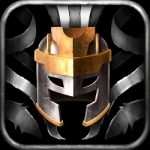
RAVENMARK: Scourge of Estellion
Games
App
50% OFF FOR WWDC! Experience the award-winning wargame, Ravenmark: Scourge of Estellion, where epic...
